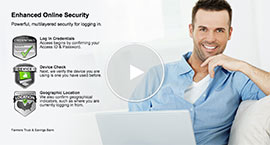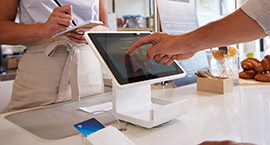Tips to Protect Yourself
Farmers Trust takes every precaution to make sure your account and personal information remain safe. Below are some simple steps you can take to minimize your chances of becoming a victim of fraud and identity theft.
For additional information and resources, visit the Federal Trade Commission Identity Theft website.
Free Annual Credit Report
It is important to review your credit report at least once a year to ensure the information is correct and free of any suspicious activity. Under the FACT Act amendments to the Fair Credit Reporting Act, you are entitled to one free Personal Credit Report in a 12 month period. To request this free annual report, you may contact the Central Source online or call toll free at 1-877-322-8228.
To dispute information in your credit report or for problems with the Credit Reporting Agencies, you
must contact Equifax, Experian or TransUnion directly.
must contact Equifax, Experian or TransUnion directly.
| Credit Reporting Agency | Website | Phone Number |
|---|---|---|
| Equifax |
www.equifax.com |
1-800-525-6285 |
| Experian |
www.experian.com |
1-888-397-3742 |
| Transunion |
www.transunion.com |
1-800-680-7289 |
Identity Theft Precautions:
- Never provide personal information over the phone or the Internet if you did not initiate the contact. Farmers Trust will NEVER ask you for any private information (such as account numbers, passwords, social security numbers, etc.) through an unsolicited email.
- Purchase a shredder and shred financial and personal documents you no longer need, such as credit card offers, pay stubs and utility bills, before discarding them.
- Only carry necessary identification in your wallet or purse. For example, do not carry your Social Security card.
- Do not print your Social Security number on your checks.
- When a Social Security number is requested, confirm that it is actually needed rather than some other identifier.
- Use online banking to pay your bills online. The fewer personal documents sent through the mail, the less chance there is for identity theft.
- Closely monitor your bank account statements and credit card bills. Contact your financial institution immediately if there's a discrepancy in your records or if you notice something suspicious, such as a missing payment or an unauthorized withdrawal.
- Post with caution. Information you post online, especially on social networking sites, can be collected in an attempt to steal your identity. Keep information such as birthdates and addresses confidential unless you are on a secure and reputable website. Understand how privacy settings work on social networks and websites you frequent and set them to your comfort level.
- Avoid using public computers, such as those in libraries, hotels or Internet cafes to connect to online banking sites because of the risk of spyware residing on the public equipment.
- Reduce the number of credit offers you receive by contacting the National Consumer Credit Reporting Agencies at 1-888-5-OPTOUT (567-8688). You can opt out of receiving credit offers for five years or opt out of receiving them permanently.
Email and Internet Safeguards:
- Delete suspicious emails from unknown sources without opening them.
- Do not click on links in an unsolicited email asking for personal information. Farmers Trust will NEVER ask you for any private information (such as account numbers, passwords, social security numbers, etc.) through an unsolicited email.
- If you receive an email that warns you, with little or no notice, that an account of yours will be shut down unless you reconfirm your personal information, do not reply or click on the link in the email. Call the company cited in the email using a telephone number you know to be genuine to confirm if the request is authentic.
- Do not send confidential information such as account numbers and passwords over the Internet in an email.
- Before submitting confidential information through a website, make sure the connection is secure. Normally, the URL address will begin with "https://". You should also see a locked padlock icon in your browser's address bar.SSL Icon
- Always log off websites where you have entered a User ID and Password when you are done with your online banking session.
- Have the latest security software, anti-virus, Web browser and operating system installed on your computer or mobile device. Enable auto-update features to ensure you have the most up-to-date security. Use a personal firewall.
- Protect your wireless network. Ensure your wireless router requires a secure password.
- Keep your online banking password secure. Do not share your password or use obvious or easily obtainable information such as your name or date of birth. Select a password that uses upper- and lower-case letters, numbers and special characters to make it harder to guess.




